COVER- Unapologetic: Prosecutor defends record while critics take aim
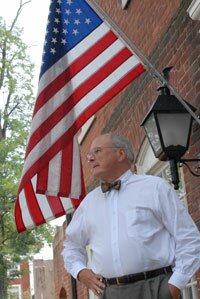
Jim Camblos comes from a long line of attorneys, including three judges.
PHOTO BY JEN FARIELLO
Jim Camblos has been the Albemarle County commonwealth's attorney for almost 16 years, deciding which cases to prosecute– or not.
Now that he's running for his fifth four-year term, his decisions to prosecute are coming under close scrutiny. Local blogger Waldo Jaquith, for instance, recently blasted Camblos for charging four UVA students with "brandishing a firearm" when they were using a broken BB gun to make an on-campus film. And Jaquith's site, cvillenews, called Camblos' decision to prosecute four teens "ludicrous" in what became derided as the "smoke bomb" case.
"I've always been willing to make difficult decisions," says Camblos, and he disputes the notion that he's controversial: "I don't think I am, and the general public in Albemarle doesn't think I am, either."
He suggests that people who criticize his performance either don't live in Albemarle County– or are a "certain segment of the media."
Whether any fall-out from those two prosecutions will affect Republican Camblos' November bid for another term is hard to say, but they did produce his first serious opponent since 1995: Democrat Denise Lunsford.
"I felt the overall quality of representation provided to the people of Albemarle County was not up to par," says Lunsford, explaining her candidacy.
One thing is certain: while Camblos may have his detractors, his supporters are fiercely loyal.
Juris familias
Apparently Camblos is genetically wired to practice law– he's the fifth generation in his family to do so, and his father, Jack Camblos, served as Albemarle's Commonwealth's Attorney in the 1970s.
Three forebears were judges, a position Camblos has sought twice– unsuccessfully– most recently earlier this year when the Albemarle Circuit Court robes went to Cheryl Higgins.
Camblos, 61, has lived here all his life, leaving only to get his law degree at Western New England College in Springfield, Massachusetts, a sojourn from which he returned with his wife, Chris.
Camblos still says some of the best advice he ever got was to ask out the cute brunette in Apartment 2 in Boston. "He won over my German shepherd before me," laughs Chris; they've been married 34 years.
Their two sons, Lyle, 30, and Mark, 27, who both now live in Waynesboro, faced their teen years with their dad as the county prosecutor.
"They knew they had to behave, and the few times they didn't, they had to pay the piper," says Chris Camblos. "They've always been very supportive and proud of their father."
A nurse case manager at Martha Jefferson, Chris is not a big fan of the media. "Lots of times he's interviewed, and what he says is twisted around... I think things are printed for the sensational effect to get people to read it," she says.
Jim "is extremely, painfully honest. He looks at both sides," his wife adds.
"There are a lot of people in my corner who quietly support Jim because he does a good job," says a self-proclaimed liberal, architect Bill Atwood. He served in the Army Reserves with Camblos and calls his Republican buddy of 30 years "a solid guy," adding, "I think today, most people in the public sector get hammered for making tough decisions."
Defense attorney David Heilberg remembers his first office 25 years ago, when Jack and Jim Camblos were in practice together, and he was their tenant.
"His dad was one of the most respected and able prosecutors I've ever met," says Heilberg. "Everyone thought highly of him."
Heilberg and Jim Camblos have often found themselves on opposing sides, perhaps most notably in the "smoke bomb" case, in which Heilberg represented one of the four youths, a then 13-year-old Jack Jouett student who was the only one to risk going before a jury. The boy was acquitted.
"He's completely trustworthy," says Heilberg of Camblos. "Where he gets himself in trouble– he shoots from the lip. He speaks without completely thinking things through."
Greatest hits list
Waldo Jaquith admits he's not a lawyer and even concedes he doesn't know what makes a good commonwealth's attorney. Nonetheless, the founder of Charlottesville's first news blog, cvillenews.com, and former contender for City Council is no fan of Camblos.
"It seems like he flips a coin to determine whether to prosecute a case," says Jaquith, who last year compiled a list of "Jim Camblos' Greatest Hits," decisions Jaquith clearly sees as mistakes.
Here's Jaquith from less than a month ago: Remember the BS charges brought against four UVA students after they filmed a scene that involved a BB gun for a class assignment? Albemarle commonwealth's attorney Jim Camblos actually charged them each with "brandishing a firearm." Well, four months later Camblos was forced to accept that the charges were just goofy. The whole thing smacked of his equally ludicrous charges in the "smoke bombers."
Camblos says he's never met Jaquith or looked at his website. But he defends his decisions in the cases Jaquith compiled– except for one.
That was an accident on U.S. 29 in June 1998. A 19-year-old UVA student named Sarah Roth claimed a bee in her car caused her to swerve and collide with a car driven by Lois Deane and her two granddaughters, Renee and Cheyanne, killing all three.
Camblos refuses to discuss that case on the record or his decision not to prosecute Roth– a decision that enraged Lois Deane's distraught husband, Edward. Albemarle Court records show Edward Deane was charged April 11, 1999, with trespassing at Glenmore, where Camblos used to live.
David Heilberg says he talked to the officer investigating the case and saw the "mutant bee" that was found in the car. "It was the largest bee I've ever seen," he says. "As awful as that case was, that was Jim exercising good judgment, a good example of him understanding both sides."
While Camblos was criticized for not filing involuntary manslaughter charges against Roth, he also took heat for a case in which he did file charges against an assistant dean at UVA's McIntire School of Commerce.
On April 9, 2002, Michael Atchison fell asleep behind the wheel, ran a stoplight, and slammed into a car driven by Yu Ching Yeh, 29, who died from his injuries. The case was thrown out because Camblos neglected to subpoena a key witness.
"I made a mistake," says Camblos. "I felt he should be prosecuted. I was completely focused on the driving, and the cause of death was so obvious that I forgot to subpoena a doctor at UVA to testify to the cause of death. I went on TV and apologized the next day. I made a mistake– that doesn't make me controversial."
"Sloppy," says Jaquith. "He forgot to subpoena a key witness?"
"I've never seen any prosecutor not go crazy to get a continuance or delay if a vital witness is not available," says Debbie Wyatt, a well-known local defense attorney.
In March of 2003, the same year charges against Atchison were dropped, an Albemarle deputy sheriff named Stephen R. Shiflett reported that he'd been shot by a black man, prompting Shiflett's boss, Sheriff Ed Robb, to brand the incident a "hate crime."
Investigators later determined that Shiflett had shot himself and lied about it, but no charges were ever filed against him.
Jaquith cites a story by then-Daily Progress reporter Reed Williams that "found Camblos has filed charges against many people for filing false police reports"; Jaquith calls the failure to do so in this case "galling."
"We never were able to prove he was lying," says Camblos today. "I was not cutting him a break because he was a deputy with the Sheriff's office. He was lying– but you have to be able to prove it."
"I'm disappointed the matter was never brought to court, but I can't hold Jim responsible for that," says Robb, who has endorsed Camblos' latest run. "If there isn't sufficient evidence, there isn't sufficient evidence."
Robb points out that Camblos has to make difficult decisions. "I don't really think he's that controversial," says the Sheriff.
Another case on Jaquith's list is that of Buckingham couple Edward and Angela Bourne, who allegedly were forced off U.S. 29 in June 2005 and beaten up. Charges were not filed against their attackers because they were from Maryland, and it would have involved extradition, Jaquith says.
Camblos offers another version of that story: Angela Bourne was driving when a car driven by a black man from Maryland passed them at a high rate of speed. "They felt threatened and forced off the road," he explains. "They take off and catch up. The husband uses the one-finger discount plus liberal use of the N-word."
The two cars stopped, and according to Camblos, Angela Bourne got out and used the N-word, unaware that another car carrying three or four black men was traveling with the first, and the men took a dim view of the racial epithet and the pursuit.
"They acknowledged that they used it," says Camblos. "The Bournes chased the black man and used the N-word. The detective would say the Bournes were the aggressors. They wanted us to extradite, and I wouldn't do it."
Alleged bomb plot
Of course, the most recent high-profile case to involve the Albemarle Commonwealth's Attorney office was last year's arrest of four teens accused of plotting to blow up Albemarle and Western Albemarle High Schools. The incendiary evidence seized from one boy's father's locked gun safe consisted of fireworks, two guns, a pack of kitchen matches, and a single roadside stand-grade smoke bomb.
Camblos is adamant that he wouldn't do anything differently in that case today. He notes that three of the boys, represented by attorneys, were found guilty in juvenile court, where the youth that prosecutors called the "ringleader" pleaded guilty.
"I would much rather answer to a few media critics and disgruntled parents than to have to write letters of condolence to parents whose children were killed," says Camblos.
"Most egregious" are the words Jaquith uses to describe that case. "It turned out there was just nothing to it."
Unlike this spring's fake bombs found at Brownsville Elementary that shut down western Albemarle schools for a day, the "smoke bomb" plot, when taken to court, ultimately hinged not on any physical evidence but on murky statements to peers about avoiding school on a certain day and on the boys' own comments made at the police station without counsel and without the presence of their parents.
In a radio interview, Camblos informed listeners that the alleged ringleader was born on April 20, which is Adolf Hitler's birthday, and that was a key factor in his arrest.
"That was grandstanding and the desire to instill fear," says Jaquith, who also questions Camblos' possible threat to reporters after the closed trial of three of the boys in Juvenile and Domestic Relations Court on March 28, 2006.
"If anyone talks about it, they're in violation of a court order," Camblos told reporters outside the courthouse, "and we'll come after you to ask who talked about it."
"They weren't supposed to be talking about the case," Camblos reiterates more than a year later. "The judge had made a statement from the bench not to talk about it."
He says it was never the prosecution's intention to lock up the defendants and throw away the key, but to see that they received the counseling they needed. He's not surprised by the level of interest in the case.
"It involved our children," says Camblos. "The defendants were children. We weren't allowed to talk about it. When you talk about children, people get very upset."
Still upset more than a year later are at least two parents of the boys who were charged.
When Fred Newsom heard the Hook was doing a story on Camblos, he called to make on-the-record comments, even though this newspaper has never before published the name of his son, Alan, in connection with this case because he was 15 at the time he was arrested.
Alan Newsom, by then enrolled in Albemarle High, had previously made headlines as a sixth grader at Jack Jouett Middle School when he sued– and won– a case against Albemarle County Schools for making him take off his NRA t-shirt.
After Alan was arrested in the bombing incident on February 1, 2006, "His name was all over the [Daily Progress] with his picture on the front page before he had a chance to put up a defense," complains Fred Newsom, who says the damage to Alan's reputation is done, and he says he's eager to get the word out now that his son's case has been dismissed and the record expunged.
The elder Newsom claims that his family was intimidated from the first press release the police issued and was threatened that Alan's name would be in the paper– all, he says, "because they didn't have any evidence."
He still maintains that Alan was never involved in any plot to blow up schools, and that he was only trying to befriend the troubled 16-year-old who had put malevolent comments online.
Alan spent 110 days in jail, during which, his father says, he was denied counseling. Fred Newsom scoffs at the notion that authorities just wanted to help the boys. "They were going to send these kids to Richmond for years," he says. "It wasn't to get them help. That's bull."
He says the cost to the family, both financially and emotionally, has been huge. Alan's defense was "more money than I've ever spent on anything, and my business income was down by 53 percent," he says. His wife had a heart attack because of the stress, he adds.
And when the whole case seemed to be winding down, the elder Newsom faced a contempt of court charge. His crime? In asking the Albemarle County School Board when Alan might be readmitted to public school, he violated the judge's order not to talk about the case.
In deciding the contempt case against the elder Newsom, Judge Paul Peatross remarked that it was a technical violation and declined to assess any penalty.
"You have decent people in the courtroom for contempt," John Whitehead, head of the Rutherford Institute, which is dedicated to civil liberties, said at the time. "Their main concern is their children. This is a road that could have been avoided if police and the school system hadn't overreacted. In my opinion, this never should have been in the judicial system."
"It's my opinion that [Camblos] plays fast and loose with the law," says Newsom. "I feel he's violated the law of Virginia and the United States– if the Constitution is still the law– and I find him not to honorably represent the people of Albemarle County."
More than a year later, Newsom still believes, "If the law had been followed, we wouldn't have been put through hell."
The father of the 13-year-old boy who was acquitted by a jury also has some words for Camblos.
"The experience we went through gave us a chance to see up close how the system operates– I won't say 'works'– and it revealed a lot that was scary," says the dad, who asks that his name not be used because his son, arrested in front of his peers at Jack Jouett Middle School, is now in high school and would like to put the trauma behind him.
He accuses Camblos of intimidation tactics, selective prosecution, and running his office like a "fiefdom."
"How things look politically shouldn't be a factor" in prosecution, says the boy's father. "In my son's case, the motivation seemed to be, 'We can get a conviction, let's go for it,' not whether it has any merit or what's the truth."
"Those suggestions are coming from people who don't know all the facts," Camblos responds. "I feel nothing was improperly done with those four, and the judge properly convicted them." [One boy pleaded guilty, and three were convicted in juvenile court. Two of those convicted appealed, as did the 16-year-old Western Albemarle student born on Hitler's birthday who originally pleaded guilty.]
"Probably he erred more on the side of pursuing a marginal case," observes Heilberg. "I think the problem originated with the Albemarle police."
In court, a videotape of the boy's interrogation showed him repeatedly telling Albemarle police sergeant Linda Jenkins that any alleged plot was a joke and that he didn't even know the Western Albemarle teen whom police called the ringleader.
Albemarle police Chief John Miller declined to comment for this article.
A prosecutor has to be a judge before a case goes to the judge, says Heilberg. "You're an official. One of the hard things for a prosecutor to do is say no to the police or victims."
Off the list
Virginia does not require that the prosecution disclose evidence it has against defendants, and their lawyers must file motions of discovery to obtain that material. To reduce the number of motions, many commonwealth's attorneys maintain an open-file policy giving defense attorneys access to evidence such as police reports.
Camblos' critics charge that he intimidates defense lawyers by denying them access to such files.
Attorneys Dana Slater and Janice Redinger were off the list after they defended Robert Cooke, the man convicted of killing Ingo, a police dog, during a 2004 pursuit after a breaking and entering. (Cooke maintains he fired down to scare the dog away and that an officer was actually responsible for firing the shot that hit Ingo.)
The trade-off in the open-file policy is that the Commonwealth's Attorney Office doesn't want to be "bombarded with pretrial motions. But to zealously defend a client, sometimes that's necessary," explains Heilberg.
And Heilberg, too, has found himself off the open-file list. It happened after he successfully defended the 13-year-old Jouett student acquitted in the Smoke Bomb trial.
"I got my open file [access] closed for a few months," he says, adding that the move felt like "retaliation" for winning the case.
"It's not intimidation," declares Camblos. "If you come in here and act irresponsibly, and we feel we cannot trust you as an attorney, the only way to protect the system is to take you off."
Not surprisingly, Debbie Wyatt, an attorney who has defended many criminal defendants and pursued several civil cases against local officials over the years, does not have open file access. She says she's done better without it, and calls the policy a "joke."
"It's not a complete file, and sometimes information is not in the file," says Wyatt. "If you file a motion for discovery, you'll get more information and can appeal it."
Yet, she notes, "So many lawyers are scared they'll get cut off from it and won't get to see it."
Wyatt and Camblos have clashed on many cases, and she's a more vocal critic than many attorneys in town. She produces a form ordering disposal of evidence– a cartridge– in a case in which Albemarle police fatally shot an unarmed man named Frederick Gray at Squire Hill apartments on May 15, 1997– a case in which she later won a $4.5 million civil award. The form, dated January 29, 1998, has Camblos' name signed by his secretary, according to Wyatt.
"It's my understanding it's a crime to destroy evidence while a case is under investigation," she says.
Camblos, however, contends the case was closed out because charges were never filed. "This was nothing more than a routine evidence disposition. We get a lot of stuff in that is not used in investigations," he says. "There was nothing devious."
Also routine, says Camblos, is to have someone else sign his name to the disposition forms– one sheet for every piece of evidence. "Hundreds of these things come into the office," he says.
Wyatt's praise for Camblos is faint. "I think he has a deep sense of loyalty," she says. "Generally that's a good thing, but not for the commonwealth's attorney. There's also the other side of the coin– vindictiveness."
Camblos boosters
Certainly not all of Camblos' actions in high-profile cases have drawn criticism. There's another coterie who rave about his work.
Suzanne Kogut is one. As the executive director of the SPCA, she's very pleased with Camblos' prosecution of two animal abuse cases, including a Free Union area dogfighting case in which Camblos won an 18-month sentence for the perpetrator.
"One thing with prosecuting animal cases," says Kogut, "it depends on the prosecutor's personal views. I think we see that in the Michael Vick case."
And then there was the case of Carmen, a cat who was shot by a neighbor in Bentivar subdivision in April 2006. In the trial of the shooter, local car business owner George Seymour, Kogut was impressed by Camblos' Perry Mason moment.
Camblos got Seymour's wife, Kathy, to deny that her husband had ever shot a companion animal. Then he questiond her again, asking if she might recall that her husband had once shot one of his own dogs. Mrs. Seymour suddenly recounted that when a pet German shepherd had knocked her down when she was pregnant, George Seymour took the dog outside and dispatched it.
"He did a good job of bringing that information out in a way that had the most impact," recalls Kogut. In a state where the law can treat companion animals as less valuable than livestock, Camblos won a conviction, and Seymour was ordered to serve 10 days in jail.
"We found Jim to be a friend of the animals and to spend as much time on those cases as it took," says Kogut.
Camblos also gets high marks from Susan Painter, who has worked in the Victim/Witness Assistance Program for 17 years. She says her office is in "almost hourly" contact with the Commonwealth's Attorney office.
"One of Jim's greatest strengths is he has an amazing office," says Painter. "I think he really does look at the bigger picture and tries to work at an outcome that's best for all."
Law enforcement groups have also come out in support of Camblos, including Sheriff Ed Robb, former sheriffs George Bailey and Terry Hawkins, Scottsville Police Chief Robert Layman, and the Albemarle Law Enforcement Association.
Well-oiled machine
Public Defender Jim Hingeley agrees with Painter. "I think Jim is an excellent manager," Hingeley says. "He's able to attract really good people to work in the prosecutor's office."
Critics and supporters say that Camblos' biggest assets are the four prosecutors who work in his office, three of whom– Rick Moore, Ron Huber, and Jon Zug– are veterans of the Charlottesville Commonwealth's Attorney Office. Huber briefly challenged Camblos in the 2003 election before withdrawing after about two weeks.
"It's great to work for Jim," says Moore. "He really cares about the county and treats his people well. He's really fair."
As for why he's seen as controversial, "He says what he thinks," says Moore (who also reveals that his boss makes a mean cheesecake).
Cynthia Murray worked for Camblos for 10 years before moving over to Northrop Grumman Sperry Marine to pursue the international contract administration career she'd always wanted.
"It was bittersweet," says Murray of her move. "I obviously liked being a prosecutor."
She says Camblos hired her because he was looking for diversity and an attorney who spoke fluent Spanish. "He has very little turnover in that office," she notes. "That not the case for other [commonwealth's attorney] offices."
Why is her former boss perceived as controversial? "He's outspoken, he's large in stature, and that can be intimidating," she says. "In my experience, most leaders are controversial just because they are the end of the line in decision making."
And criminal cases provoke stronger opinions than land use squabbles, she points out (although in Albemarle, land use policy can be a hot topic). "For that reason, Jim has taken criticism, and on the other side, praise."
Murray voices the prosecutor's frustration with wanting to reveal information to the public but being unable to do so without jeopardizing a case. "It's a delicate balance between the public's right to know and maintaining the integrity of a case," which can make it appear the prosecutor is withholding information, she says.
As for the bombing case, she says, "...It's worse when you're dealing with juveniles."
Underage drinking is a big issue for Camblos, and he wanted Murray, as his prosecutor in cases, to go to schools and make presentations to educate kids. He went with her.
And when he has made mistakes, "There was no criticism from the public or anyone else that would make him feel any worse than he already felt about himself," says Murray. "I think if he were not competent, he wouldn't be reelected so many times."
The soft side
Cynthia Murray reveals one other secret about her former boss: compassion. When her father suffered a massive stroke, "Jim was so supportive of me," she says. "He said, 'Take off whenever you need to. We've got you covered.'"
David Heilberg has a similar memory of when his 19-day-old son was diagnosed with a double hernia. "We thought he was going to die," he says. He still remembers the support from Chris, then a pediatric nurse, and Jim Camblos.
"I know his heart is true," says Heilberg. "We may differ on procedure, but never about integrity or trustworthiness."
Jim Camblos seems invigorated by the competition in this year's race and from the response he gets going door to door. As an elected official, he acknowledges the political elements of his job.
"There are decisions to prosecute where a message needs to be sent– like underage drinking," says Camblos who prosecuted the case of George and Elisa Robinson, the booze-serving parents who are now serving 27 months in jail, a sentence that made worldwide headlines. Camblos had asked for 90 days.
"I think I'm a compassionate, caring individual and not the S.O.B. people want to portray me as," says Camblos. "People who know me will tell you that."
His secret? "I treat people with respect, compassion, and dignity."
According to Camblos, "Defendants come up to me and say, 'Hey, Mr. Camblos, you're a fair guy.'"
And no matter how big the conviction, "You have to remember, there was a victim who was raped, murdered, or traumatized for the rest of their life," he says. "It's not like winning a football game."

Prosecutorial humor: Jim Camblos likes his "Reduce defense spending– plead guilty" mug.
PHOTO BY JEN FARIELLO
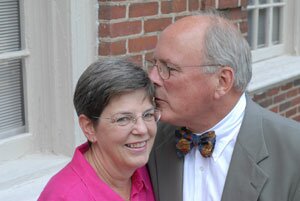
After 34 years of marriage, Chris and Jim Camblos still seem smitten, and she says her husband "has the softest heart in the world."
PHOTO BY JEN FARIELLO

Chris Camblos calls her husband "painfully honest," and says he often takes his work home with him.
PHOTO BY JEN FARIELLO
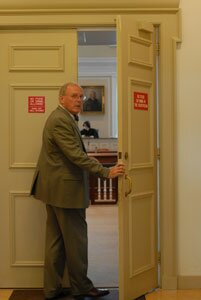
Earlier this year, Jim Camblos sought the Albemarle Circuit Court bench now held by Cheryl Higgins.
PHOTO BY JEN FARIELLO
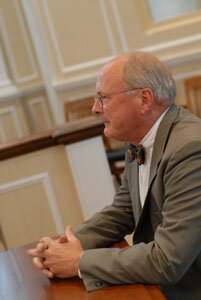
Commonwealth's Attorney Jim Camblos wants the Albemarle courts to continue to be his workplace for another four years.
PHOTO BY JEN FARIELLO
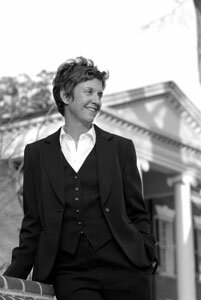
Democrat Denise Lunford is challenging Camblos in this year's race. "The past six years I have not been happy with the leadership and didn't see it likely to change," she says.
PHOTO BY JEN FARIELLO
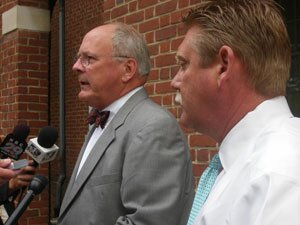
At a press conference after the arrest of serial rape suspect Toni Washington, Camblos and Detective Chuck Marshall explain that pre-arrest DNA evidence had already connected Washington to the crimes.
PHOTO BY LISA PROVENCE
#